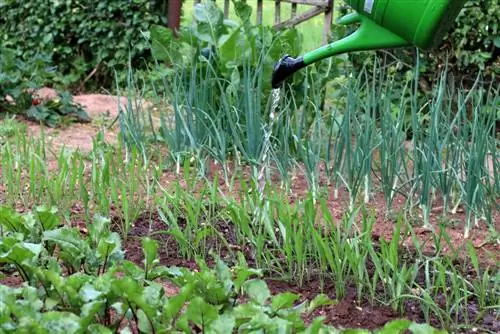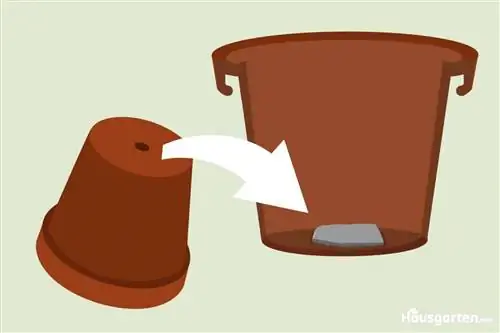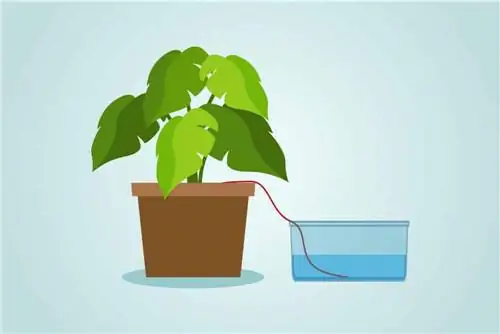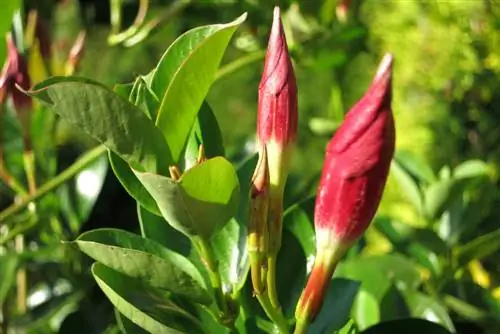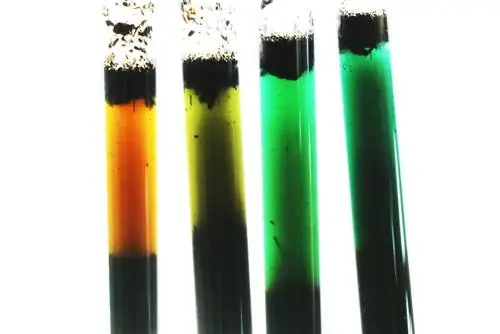- Author admin caroline@plants-knowledge.com.
- Public 2024-01-31 11:14.
- Last modified 2025-06-01 06:48.
Precipitated lime leads to unsightly deposits in the potting soil, but these are not harmful to the plant. What is much more important for the well-being of the plants is that the pH value in the substrate increases when watering with very calcareous water is carried out continuously. The optimal pH value for irrigation water is around 6. At higher pH values, deficiency symptoms can occur, for example yellow leaves (leaf chlorosis). This phenomenon is rarely encountered in garden soil because the acidic rainwater (pH around 5.6) counteracts an increase in the pH value.
Water hardness
Drinking water that flows from our pipes is not just pure water. Numerous other substances are dissolved in it, which differ in type and concentration depending on the origin of the water. The term water hardness is used to quantify some of these substances. The content of calcium and magnesium s alts in the water in particular contributes to water hardness. The higher the amount of calcium or magnesium, the harder the water is. Together with the carbon dioxide from the air, both form poorly soluble compounds called carbonates. These not only settle and form a disturbing coating, but also influence the pH value in the water.
pH value
Very calcareous water also increases the pH value in the substrate over the long term, so that dissolved minerals such as iron, copper, manganese and zinc, which are essential for good plant growth, can no longer be absorbed. Optimal irrigation water has a slightly acidic pH value (like rainwater).
Determine the degree of hardness
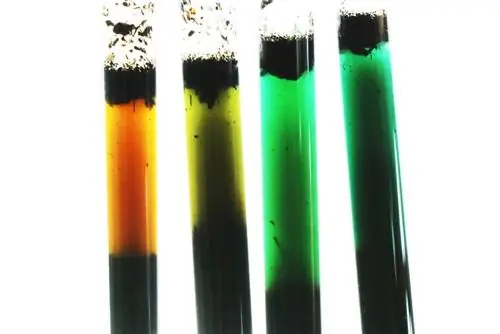
Most hobby gardeners use tap water to water their plants in their apartment because they have no access to rainwater. However, depending on where you live, the degree of hardness of the water can vary greatly. As a rule, it is very easy to find out the hardness of your own drinking water. Many water suppliers publish their values on the Internet or provide information in person. If the hardness level in drinking water reaches values above 21 °dH, it should no longer be used to supply water to plants without having been treated in advance.
| Hardness range | Calcium carbonate per liter | Hardness |
| 1 / < 1.5 mmol | 0 - 8, 4 °dH | soft |
| 2 / 1.5 - 2.5 mmol | 8, 4 - 14 °dH | medium |
| 3 / 2, 5 -3, 8 mmol | 14 - 21 °dH | hard |
| 4" />3.8 mmol | above 21°dH | very hard |
Tip:
Using test sticks from garden shops, aquarium shops or pharmacies, you can precisely determine the hardness of your tap water and take action if necessary.
The right substrate
The best protection against an increase in pH is to regularly replace the potting soil in the pot. Fresh potting soil usually has a slightly acidic pH value and is able to buffer a large part of the water hardness. An annual repotting in fresh substrate protects the plant from deficiency symptoms in the near future if watered with tap water.
Descale water from water
If the tap water has a lot of lime, there are various ways to descale the water. Some methods rely on removing the calcium (and magnesium) from the water so that lime no longer forms. Another option is to add acid in different forms to the irrigation water to lower the pH value. At pH values below 7, lime no longer precipitates because the carbonate is removed from the water.
1. Decreased calcium and magnesium concentration
If there are fewer s alts in the irrigation water, the water becomes softer and less lime can form.
A) Dilute
An effective method of descaling the irrigation water is to mix normal tap water with desalinated water. This process is a pure dilution process, all s alts in the water are retained, only the concentration is reduced to such an extent that less or no lime is precipitated.
- Dilution for hard water (hardness level 3): two parts tap water + one part desalinated water
- Dilution for very hard water (hardness level 4): one part tap water + two parts desalinated water
- Des alted water can be purchased commercially, it is available under different names
- Battery water
- deionized water
- fully desalinated water (deionized water)
- distilled water
- demineralized water
Tip:
As a rule, all ultrapure water can be used to dilute tap water for watering flowers. Exception: ironing water. It often contains fragrances.
B) Heating
Limescale contained in tap water precipitates as a solid if the water is left to stand in a container (watering can) for some time. The whole thing works faster and more effectively if the water is heated.
- Leave tap water in a sunny place for a longer period of time (at least a day)
- fill with hot tap water (from the tap) and let it stand for a day
- Heat the water in the saucepan (over 60 degrees) and let it stand for a day
- filter the water through a coffee filter before pouring
2. Lower pH value
With this method, the nutrients important to the plant are retained. Calcium and magnesium levels do not change. Only the carbonate, which is largely responsible for the formation of the solids, is removed from the water. Some of these methods require a little technical understanding and precision, so they are not necessarily suitable for every hobby gardener. Overdoses can quickly occur. Water that is too acidic is at least as bad for plants as very hard water.
A) Peat
Peat is naturally acidic and can lower the pH value to a certain extent. The advantage of this method is that overdoses cannot occur, so the procedure is very safe. However, the use of peat is not necessarily environmentally friendly and is also relatively expensive.
- about 1 g of peat in one liter of water reduces the water hardness by about 1 °dH
- the water does not have to be completely softened
- about 100 to 200 g of peat per 10 liters of water is enough
- Fill peat into a cotton bag or old stocking
- lace up
- Place in water for at least 24 hours
Tip:
Coffee grounds are cheaper and more environmentally friendly than peat. This also contains small amounts of acid, which are released into the water when soaking.
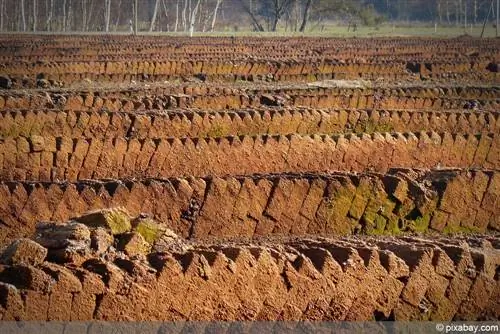
B) Vinegar or other acids
Caution is advised when dosing pure acids. If you overdose, the water quickly becomes too acidic. Vinegar should therefore either be dosed carefully or, better yet, the pH value should be checked using test sticks or a pH measuring device (pH meter). pH measuring devices are usually expensive and therefore not necessarily a worthwhile investment for hobby gardeners.
- Initially the pH value hardly changes when vinegar is added
- then there is a sudden drop in the pH value to around 4
- this is completely normal and will not cause any problems
- An overdose (below pH 4) must be avoided at all costs
- Alternative without pH value measurement: add about 1 teaspoon of salad vinegar to 6 liters of water
- lowers the pH value by around 0.5, which has a significant effect on the limescale
C) Pine needles
Fallen leaves from conifers such as firs or spruces lower the pH value in the soil. Coniferous tree compost is also suitable. When using conifer compost, not only is the irrigation water decalcified, but it is also enriched with nutrients for the plants, so that less fertilizer is required.
- about 300 g spruce or fir compost per 10 liters of water
- fill into a bag or old stocking and close with a thread
- If necessary, weigh it down with a stone and leave it to act for 24 hours
D) Pieces of wood or bark mulch
Pieces of wood or bark mulch from conifers are slightly acidic and therefore lower the pH value of tap water. A relatively safe method of decalcifying the irrigation water, as it is difficult to overdose.
- about 500 g of wood per 10 liters of water
- fill it into a cotton bag or old stocking and close it
- leave on for 24 - 48 hours
Conclusion
To descale irrigation water, very hard water can be mixed with desalinated water. Alternatively, peat, conifer compost or old coffee filters can be soaked in tap water for about a day. These substances release a small amount of acid, which lowers the pH value in the irrigation water.

